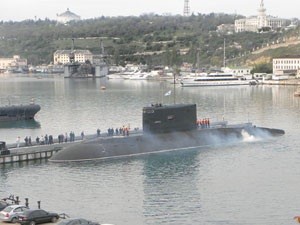Fifteen years ago, on August 8th, 2008, Russia invaded the sovereign nation of Georgia. Moscow still occupies the country’s Abkhazia and South Ossetia regions, which run along Georgia’s northwest Black Sea coastline. Together the areas totaled about 20% of the sovereign nation’s territory. Russia’s so-called “borderization” policy has caused massive hardships there and halted Georgian moves toward integration with the West, but it doesn’t stop at the border. The Black Sea itself today is a point of contention among major powers.
During the last 24 months no Western nation has participated in a Black Sea naval exercise. “No warship from a non-riparian country has entered the Black Sea since December 2021,” according to Vladimir Socor of the Jamestown Foundation. He says that it is a rare situation in modern history where Western naval powers simply have been “shut out… until further notice.”
At the same time Putin’s Black Sea Fleet sails the waters with impunity. From late 2021 to July 2022, Moscow imposed a total blockade of the Black Sea, effectively turning Ukraine into a landlocked state. The waters were then conditionally opened for 11 months until last month when Putin deployed two corvettes from the Russian fleet astride the Black Sea’s shipping lanes in both the Bulgarian and Turkish Exclusive Economic Zones, according to NATO and Radio Free Europe. Simultaneously, Russian sea- and land-based missile and drones attacked Ukrainian ports and halted civilian shipping in the Black Sea.
Although Western powers are expected to return at some point, the date remains an open-ended question. Socor says that the “causative factors behind their decision are: the dangerous environment created by Russian military actions in the Black Sea in the run-up and during the full-scale war against Ukraine; the United States’ and its allies’ policy of avoiding kinetic contact with Russian forces at almost any cost; and Turkey’s decision, when the war broke out, to bar access through the Bosporus Strait into the Black Sea for warships of non-riparian countries.”
The lack of Western navies contrasts sharply with the post-Soviet era, especially the period after Russia’s 2014 invasion of Ukraine, when a number of great power navies patrolled the Black Sea. In the past US and allied navies held annual exercises, multiple patrols, and regular port visits within the confines of the Montreux Convention limiting tonnage and duration in the area. The United States Navy was the dominant force in the region with assistance from NATO allies and the NATO organization.
The Center for Maritime Strategy points out that this unequal burden-sharing explains the fluctuations in the Western navies’ presence from year to year until 2021. The German researcher Carsten Schmiedl, notes that warships of Western allies were present in the Black Sea for 210 days in 2014, 58 days in 2016 and 182 days in 2021. NATO records indicate that the last significant exercise with the participation of non-riparian Western navies, Sea Breeze 2021, was held in July of that year. Socor says it was the “21st annual iteration of that multinational exercise, co-hosted by Ukraine and the United States and involving naval, land and air components in Ukrainian and international waters.”
This year both NATO and the Western allied countries have decided not to re-enter the Black Sea. Instead of defying Russian warnings and pushing back against Putin’s mining of Ukrainian harbors, blockage of grain exports, and missile strikes on critical infrastructure, the US and other Western nations decided not to conduct freedom of navigation operations that reinforce international maritime law. Nor have those states conducted a single humanitarian maritime operation to unblock Ukrainian agricultural exports by escorting cargo ships, or instituted a demining operation employing one of the Standing NATO Mine Countermeasures Groups.
“Russia has extended its discretionary domain in the Black Sea stage by stage, squeezing out the other riparian countries from international waters and their respective exclusive economic zones—and ultimately the Western navies from the sea during this war,” says Socor. With the 1994 seizure of Abkhazia in Georgia, Russia effectively controlled the northern portion of the Black Sea. In 2014, the annexation of Crimea enabled Moscow to control vast swaths of Ukraine’s territorial waters and parts of its exclusive economic zone and establish sole control over the Sea of Azov and Kerch Strait.
This steady seizing of important territories served as a prerequisite to the latest current blockade of Ukraine and areas of the Bulgarian and Turkish exclusive economic zones. It will be up to the United States and its Western allies and NATO to unite in the future and push back against Russian aggression in the Black Sea. Without a force countering Russian moves in the Black Sea, countries that depend on it for transportation of grain and other products will continue to suffer at the whim of the Russian government.
Daria Novak served in the U.S. State Dept.
Photo: Russian submarine Alrosa (Russian Navy Website)
